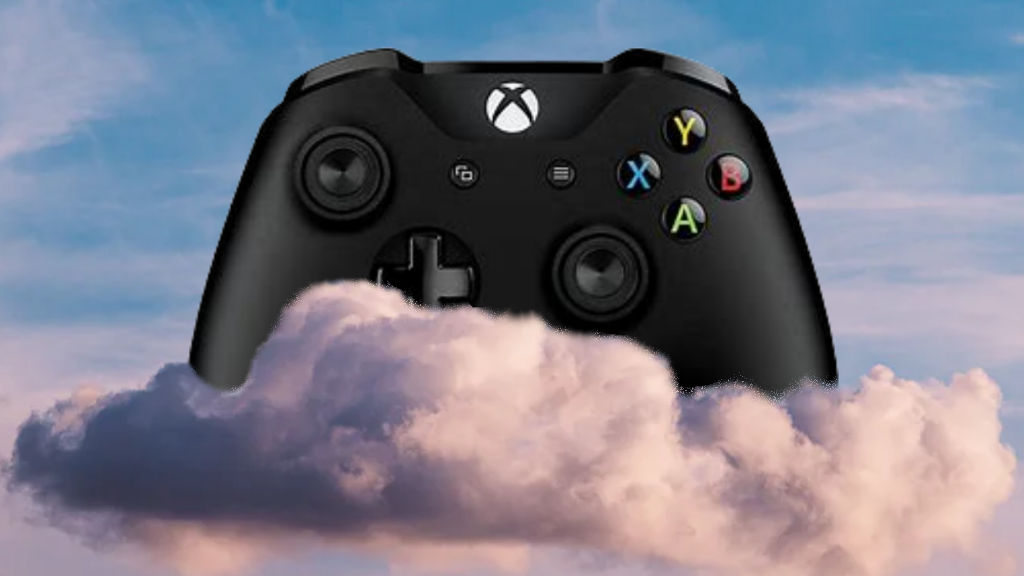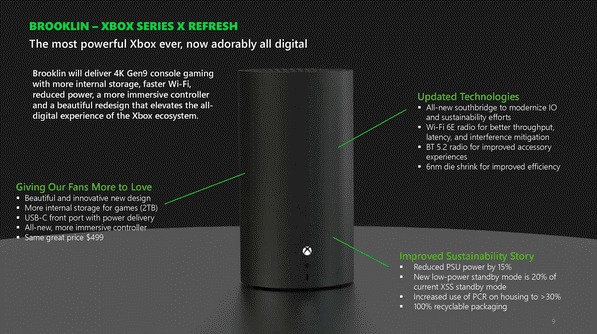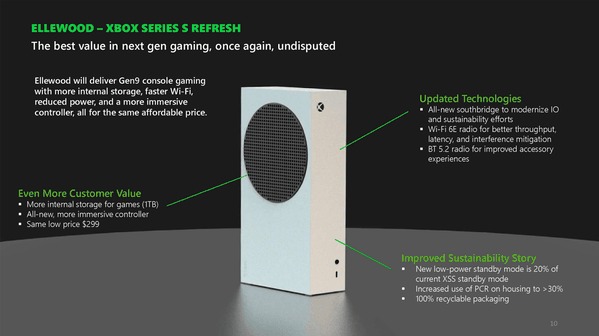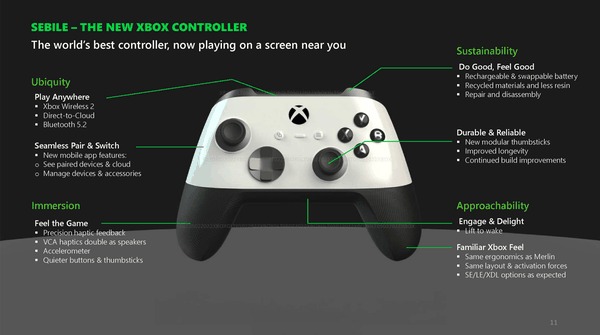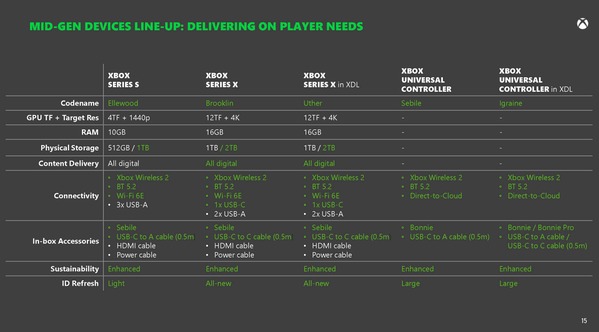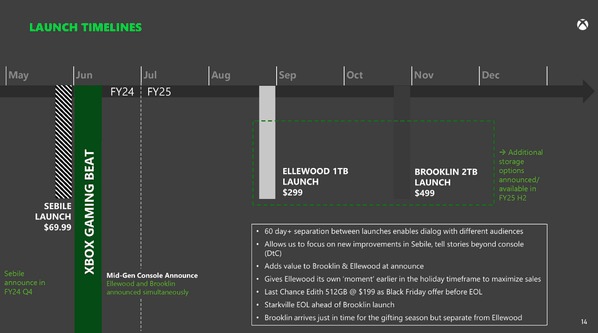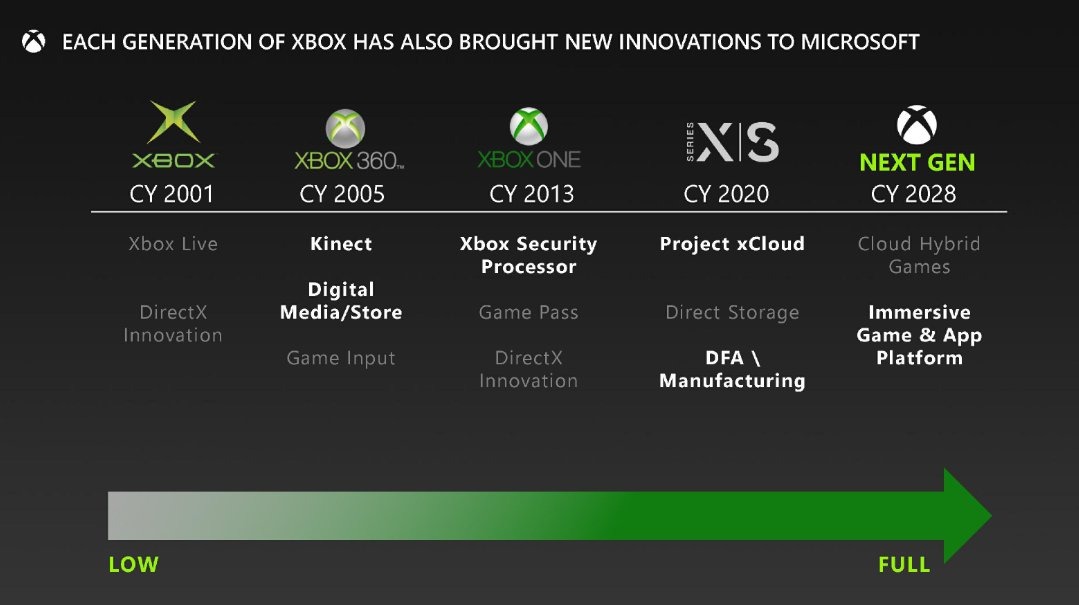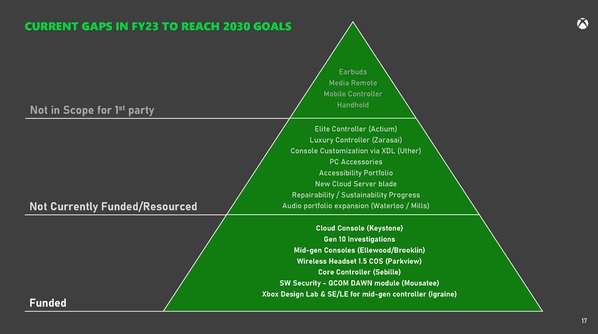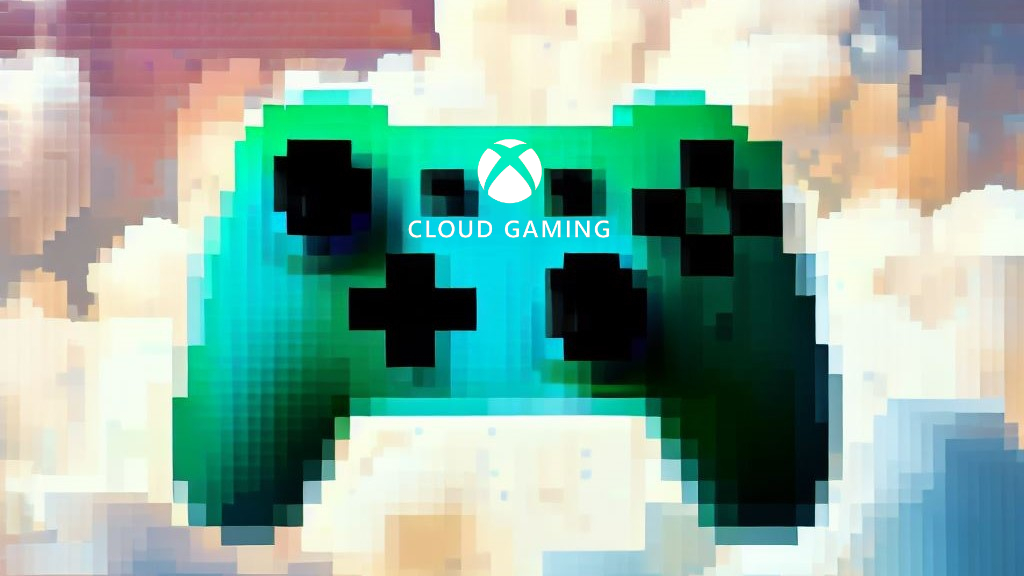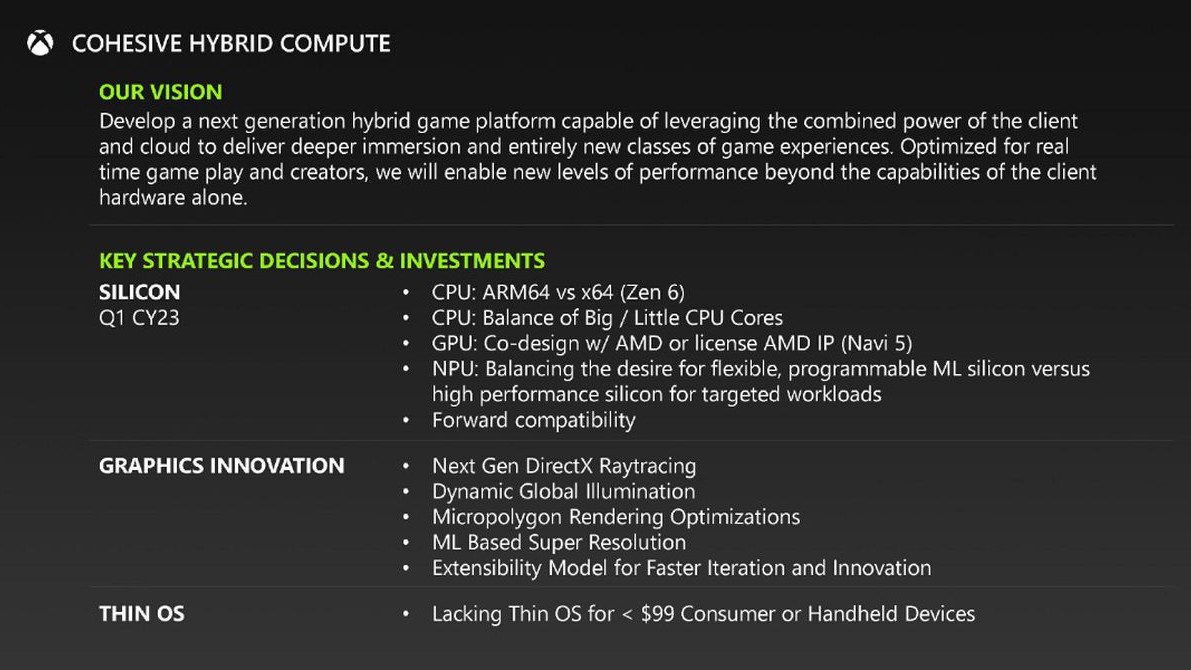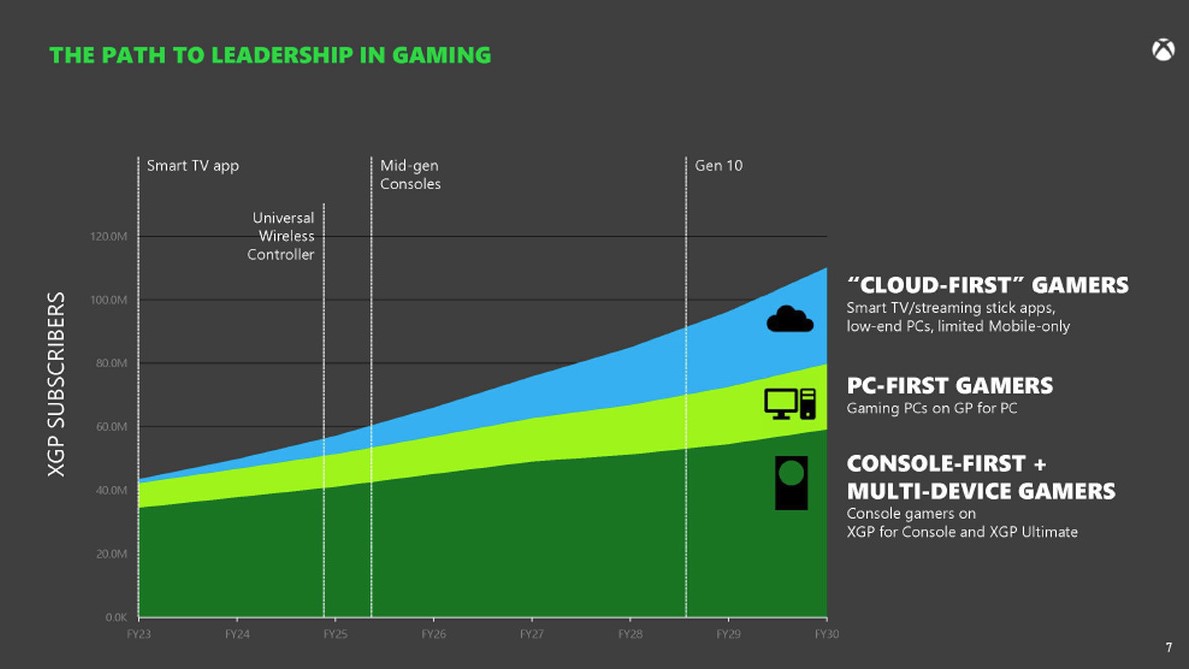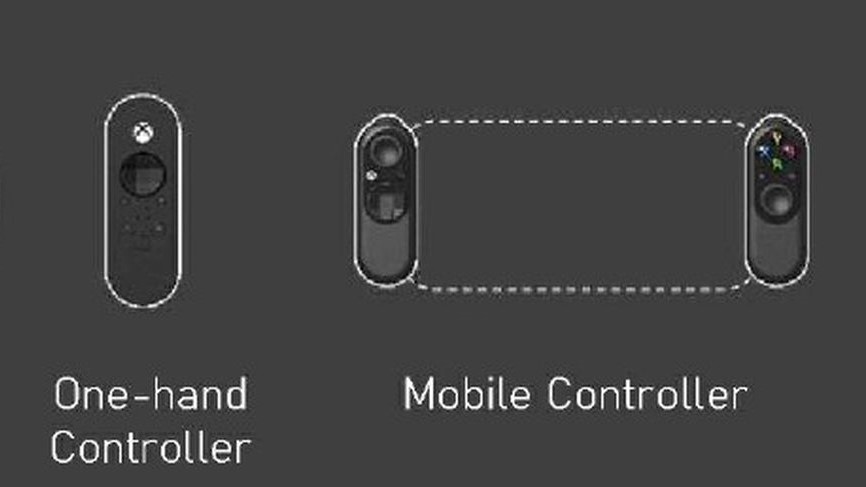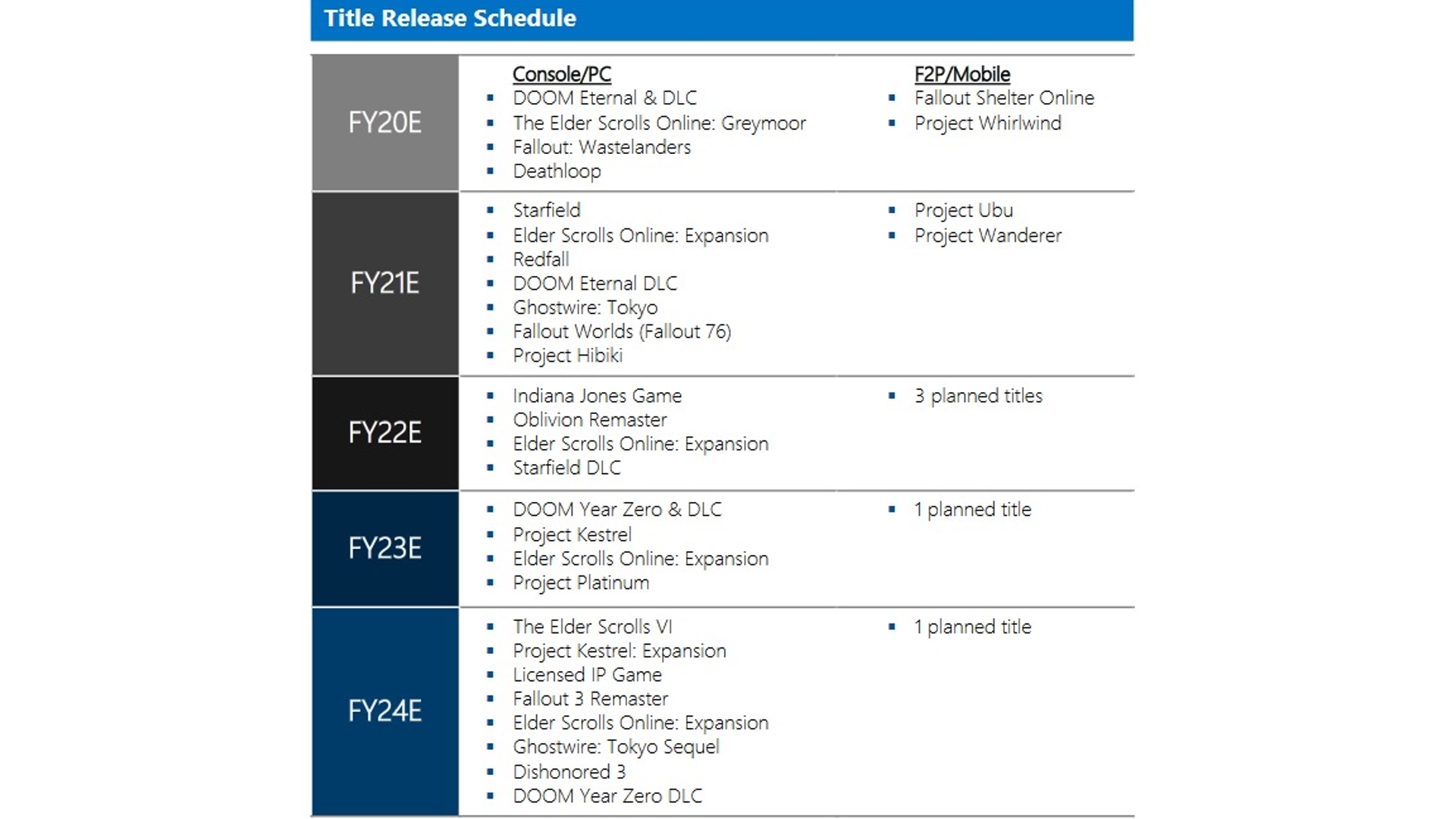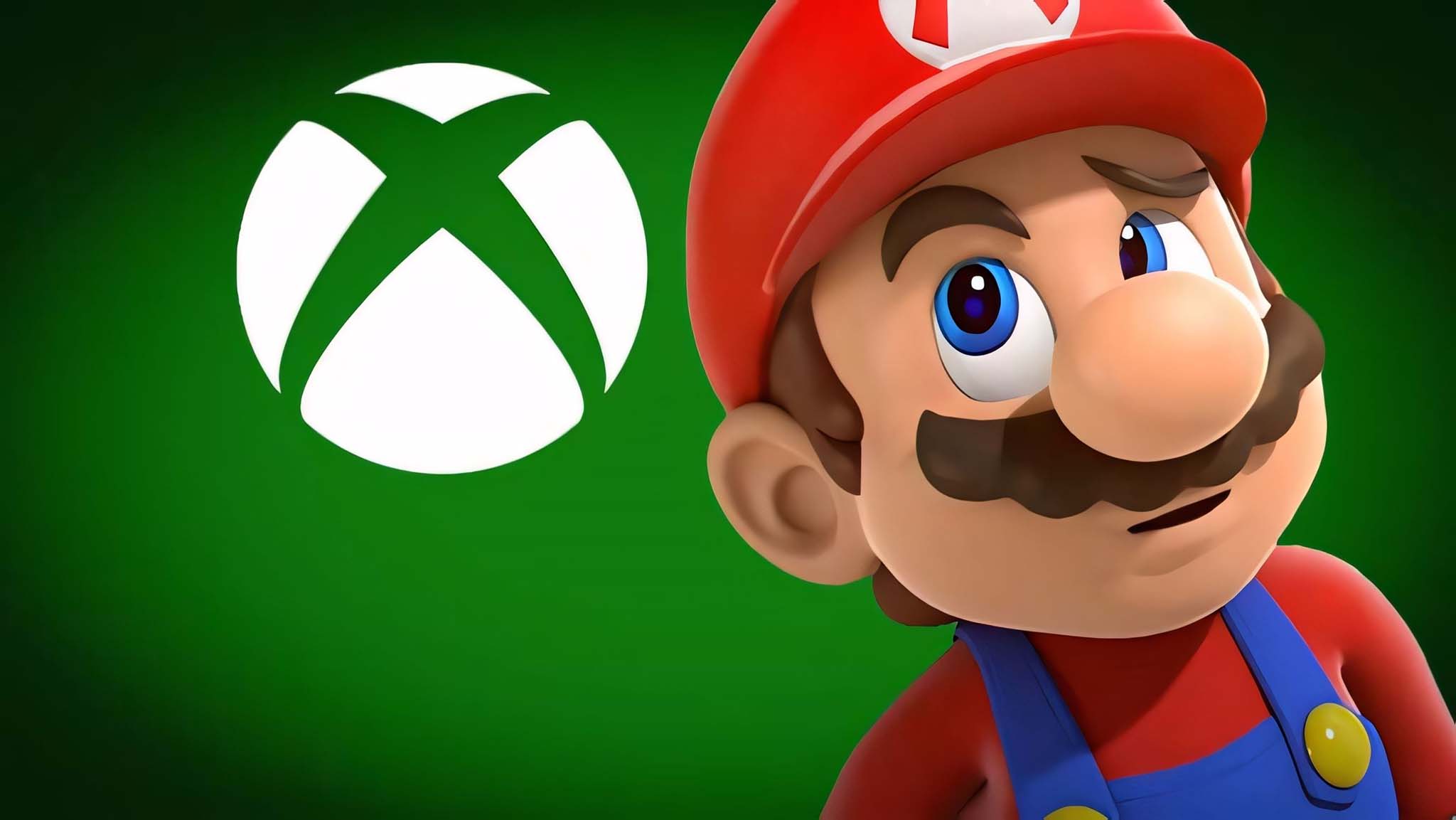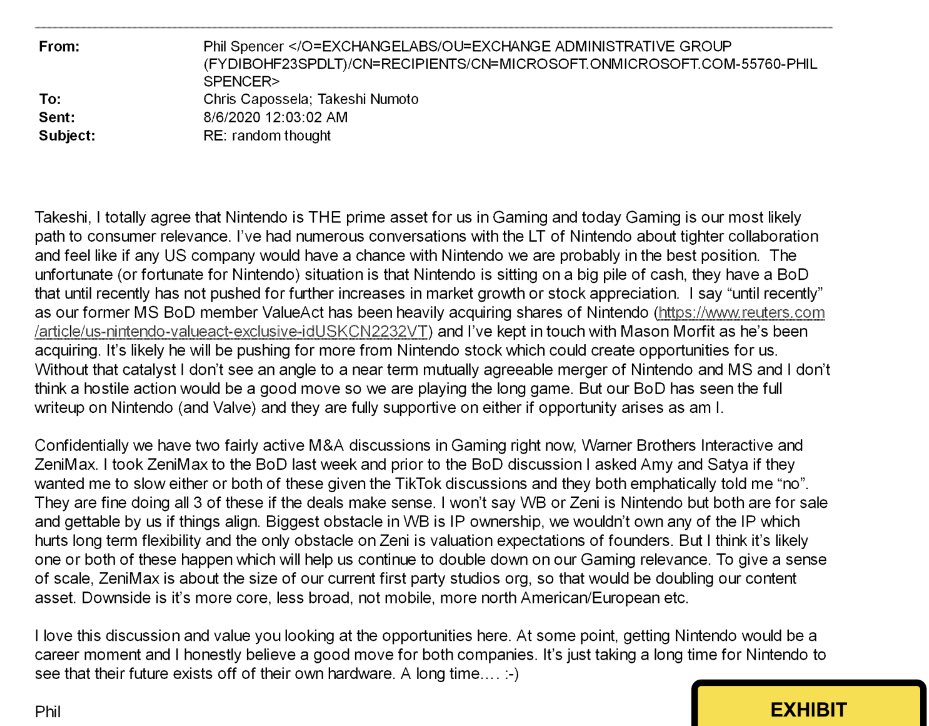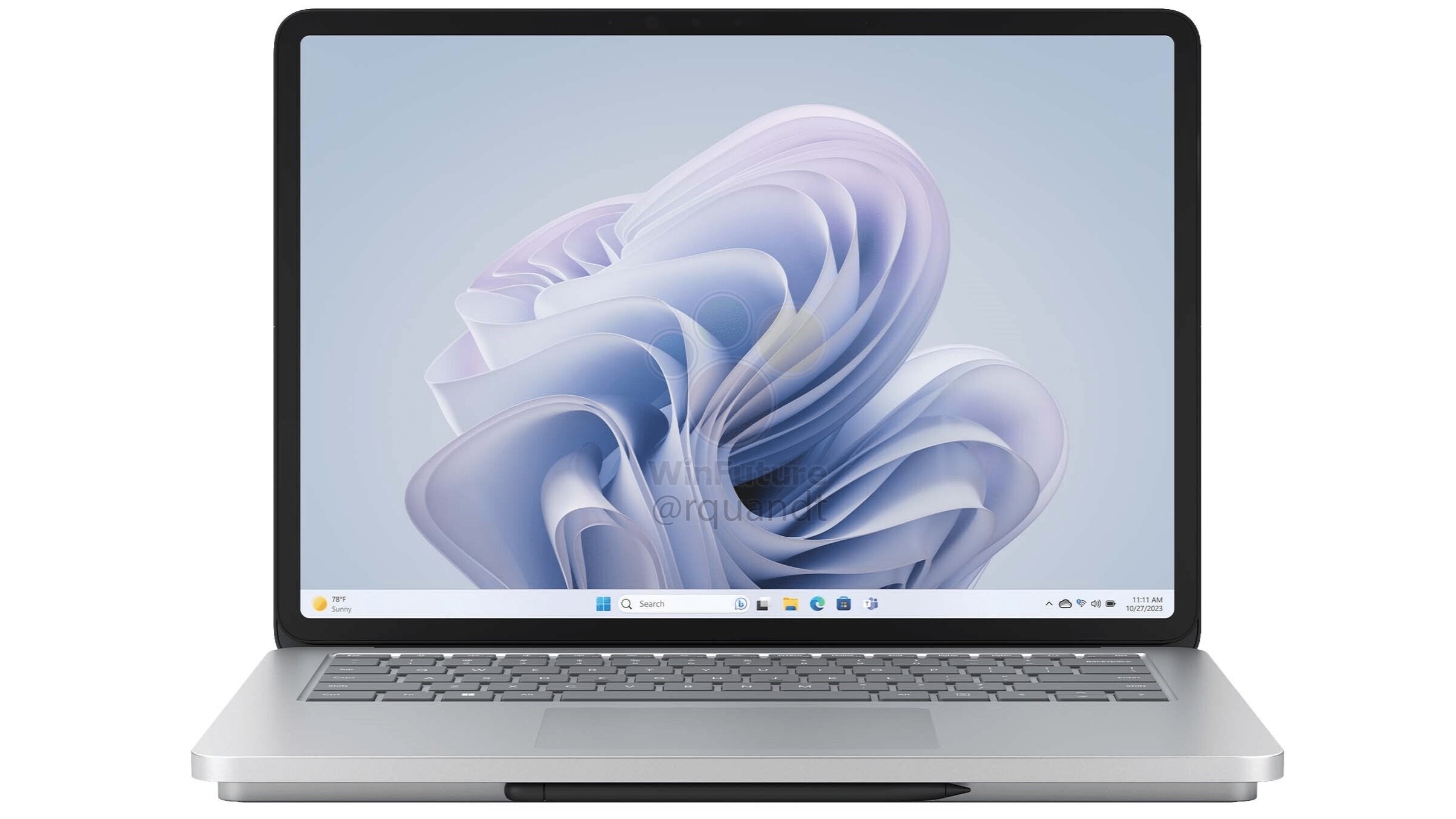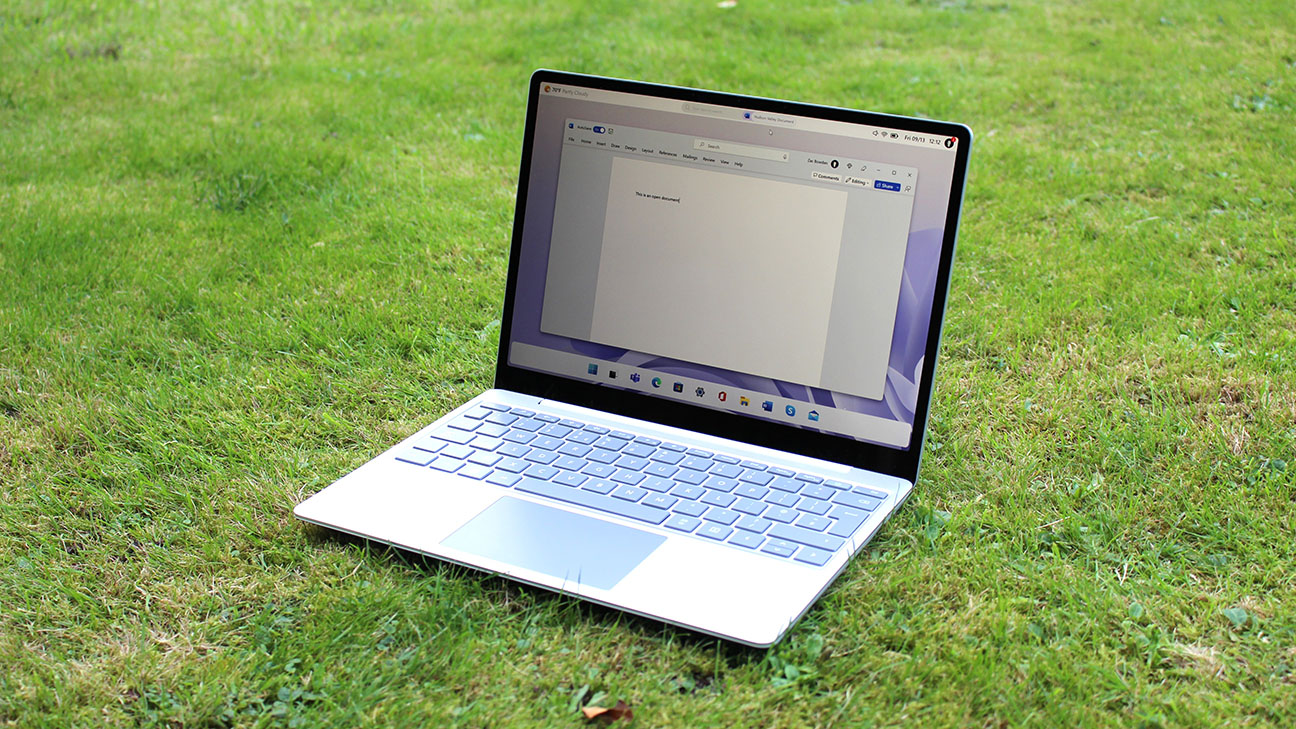The Microsoft bucket has many holes: Every recent leak from Xbox, Surface, Windows, and beyond
From an in-depth look into the future of Xbox to a sneak peek at the next Surface lineup, here's every recent Microsoft leak.
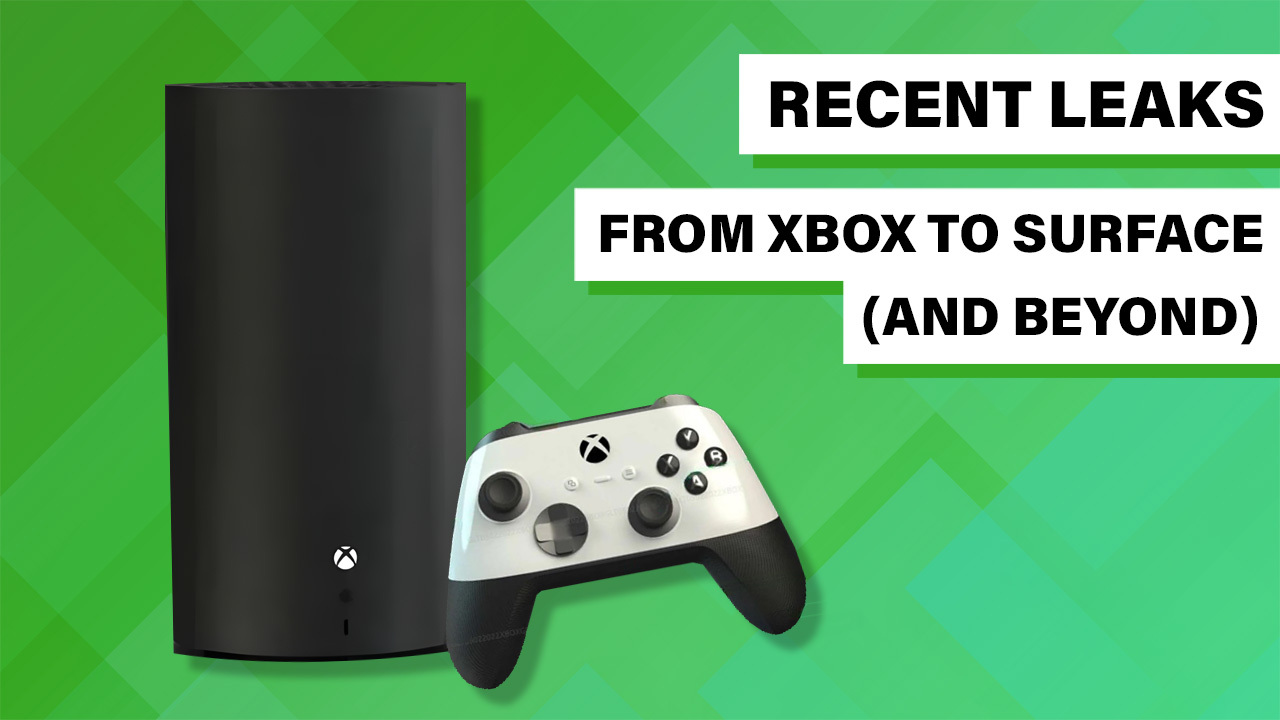
All the latest news, reviews, and guides for Windows and Xbox diehards.
You are now subscribed
Your newsletter sign-up was successful
Leaks are frequent in the tech and video games industries. They come in all shapes, sizes, and severities, and from a wide variety of sources. Most of the time, leaks happen due to mistakenly mismanaged data, and are smaller affairs that either offer sneak peeks at future products or behind-the-scenes looks at internal communications and plans. Either way, it's endlessly frustrating for the affected companies and teams — especially when those leaks accrue a huge amount of attention from consumers.
Well, it has been a particularly frustrating period for Microsoft then, as the company has been struck with a deluge of leaks. The majority of the most major reveals come from the Xbox side of the company, courtesy of accidentally uploaded internal documents from the Xbox vs FTC court case. Not all of it, though, as we've also seen recent leaks from the Surface hardware division and Windows. As my colleague Richard Devine said: The Microsoft bucket has many holes right now.
Here's every recent leak hailing from Microsoft, including Xbox, Surface, Windows, and beyond.
NOTE: While these are official leaks and not speculatory rumors, they should still be taken with liberal mounds of salt. Many of these plans are older, and strategies are constantly changing. Even then, companies as large as Microsoft are always considering a variety of paths forward. Microsoft gaming CEO and head of Xbox, Phil Spencer, addressed the recent Xbox leaks by saying as much.
Recent Microsoft leaks: Xbox and gaming
Microsoft's attempt to acquire games publisher Activision Blizzard has seen the company defend itself against a multitude of government bodies and regulators, such as the United State's Federal Trade Commision (FTC), The United Kingdom's Competition and Markets Authority (CMA), and the European Union. The former battle against the FTC, especially, has been a constant source of information, as many of the documents submitted during the trial are made available to the public (often with plenty of information heavily redacted).
However, what has become possibly the largest single Xbox leak of all time reportedly occurred because Microsoft mistakenly uploaded the wrong documents to the US Courts system, including in-depth and unredacted plans on Microsoft's future vision for Xbox, as well as past plans and discussions. There is so much information contained in the uploaded documents (since removed by the US Courts website), and much of it is substantial.
Brooklin — Xbox Series X mid-gen refresh
Possibly the single largest leak from the single largest Xbox leak of all time is the reveal of Project Brooklin, Microsoft's plans for a mid-generation refresh of the Xbox Series X. The new Xbox features a visually striking cylindrical design, which is a stark departure from the sharp-edged monolith that is the current Xbox Series X.
All the latest news, reviews, and guides for Windows and Xbox diehards.
This move also means the removal of the physical disc drive and a transition to an all-digital format, which has already seen backlash from the community despite market trends increasingly showing physical media formats taking a backseat to digital. Of course, our own Richard Devine is also in that boat, saying the Xbox Series X mid-gen refresh isn't for him without the disc drive.
The document states, "Brooklin will deliver 4K Gen9 console gaming with more internal storage, faster Wi-Fi, reduced power, a more immersive controller and a beautiful redesign that elevates the all-digital experience of the Xbox ecosystem." Improvements the Xbox Series X refresh will implement include:
- Moving to an all-digital format with no physical disc drive
- Doubling the internal SSD storage to 2TB
- Swapping the front-facing USB Type-A port for a more modern USB Type-C port with Power Delivery support (potentially indicating greater accessory support and faster controller charging)
- A Wi-Fi 6E radio for lower latency, improved performance, and reduced interference
- A Bluetooth 5.2 radio for improved accessory support and greater stability
- A smaller, 6nm die shrink (for the internal components) for improved efficiency
- Greater sustainability with 15% reduced PSU power usage, a 20% lower power usage in standby mode versus the current Xbox Series X, more than 30% use of post-consumer recycled plastic in the housing, and 100% recyclable packaging
- A USB Type-C to Type-C cable included in the box
- The all-new Project Sebile Xbox Wireless Controller (detailed below) included in the box
There's no indication from the leaked documents that the Xbox Series X refresh will feature improved performance, although a more efficient 6nm die shrink does suggest improvements to the console's internals. It seems Microsoft is considering releasing the console as the "All-new Xbox Series X," and is aiming for a Nov. 2024 release date (more info on hardware release plans below). The price is listed as remaining the same as the Xbox Series X at $499.
Ellewood — Xbox Series S mid-gen refresh
The Xbox Series S is going to receive a mid-generation refresh alongside the Xbox Series X with Project Ellewood, although it's a less dramatic change than its more expensive sibling. The design remains the same, but some of the internal improvements are also making their way here from Project Brooklin.
The document states, "Ellewood will deliver Gen9 console gaming with more internal storage, faster Wi-Fi, reduced power, and a more immersive controller, all for the same affordable price." It should be noted that one improvement listed here — doubling the internal SSD storage from 512GB to 1TB — is already available in the new Carbon Black Xbox Series S. Mid-gen improvements to the Xbox Series S include:
- Doubling the internal SSD storage from 512GB to 1TB
- A Wi-Fi 6E radio for lower latency, improved performance, and reduced interference
- A Bluetooth 5.2 radio for improved accessory support and greater stability
- 20% lower power usage in standby mode versus the current Xbox Series S, more than 30% use of post-consumer recycled plastic in the housing, and 100% recyclable packaging
- The all-new Project Sebile Xbox Wireless Controller (detailed below) included in the box
While the leaked image of the Project Ellewood seems to feature a front-facing USB Type-C port similar to Project Brooklin, it's not mentioned anywhere on that slide and a specs sheet (shown below) lists the refreshed Xbox Series S as still having a USB Type-A port on the front. There's also no mention of efficiency or performance improvements, nor does the internal RAM increase from 10GB.
It seems Microsoft is considering the console as the "Xbox Series S Light" and is aiming for a Sept. 2024 release window (60 days before Project Brooklin). The price is remaining the same as the base Xbox Series S at $299 — $50 cheaper than the 1TB-equipped Xbox Series S you can purchase now.
Sebile — Xbox Wireless Controller mid-gen refresh
The Xbox Wireless Controller was refreshed with the launch of the Xbox Series X|S, but it was a minor update to the design and feature set that left many players feeling a little disappointed. Sure, it's still one of the best Xbox controllers — and best controllers in general — but Microsoft could've done a lot more. Finally, it seems like the company is planning to do exactly that. Project Sebile is coming with the Xbox Series X|S mid-gen refreshes detailed above.
We're getting a refreshed design with expanded grips, as well as a new focus on gaming anywhere, including the cloud. Improvements to the Xbox Wireless Controller include:
- The Xbox Wireless 2 standard, which should improve stability and reduce latency
- Bluetooth 5.2 support, which should improve stability and reduce latency when connected to any device that isn't an Xbox
- A Direct-to-Cloud feature likely related to Xbox Cloud Gaming, although it's not certain what this means
- A new mobile app with seamless pairing and device switching, overview on devices and the cloud, and device and accessory management
- Precision haptic feedback, which can double as speakers
- An accelerometer, which helps enable a new lift-to-wake feature
- Quiter buttons, modular joysticks, and build quality improvements, which should improve durability, longevity, and repairability
- A rechargeable, swappable battery included as standard
- More recycled materials and less resin
Project Sebile should be instantly familiar to any Xbox players with a similar layout and buttons. Unfortunately, the documentation does not mention if the new Xbox controller will feature rear remappable buttons as standard, or if Xbox will finally support additional buttons instead of simply mapping extra buttons to existing ones.
It seems Microsoft is targeting a June 2024 release for Project Sebile — just before the announcement of the Xbox Series X|S mid-gen refreshes and well before their launch — for a retail price of $69.99. We may also see the transition from the "Xbox Wireless Controller" name to the "Xbox Universal Controller."
Future Xbox hardware release plans
Microsoft clearly has a lot of internal plans for the next few years, including for this generation of Xbox console gaming. The Xbox Series S is being refreshed with Project Ellewood, the Xbox Series X is being refreshed with Project Brooklin, and the Xbox Wireless Controller is being refreshed with Project Sebile — and that may just be in 2024.
Xbox is also reportedly working on Project Igraine, which is bringing the new Xbox controller to the Xbox Design Lab (XDL). Surprisingly, there's also mention of Project Uther, which would see the mid-gen Xbox Series X refresh be added to the Xbox Design Lab. It's not clear what kind of customizations would be available, but being able to personalize your console in the XDL would be a fantastic perk of the Xbox ecosystem. Unfortunately, the same documentation states that Project Uther isn't currently funded (or wasn't at the time this documentation was made).
As for the planned release of all these products, Microsoft outlined a roadmap in the leaked documentation. It seems it'll all start with Xbox's major June gaming event, which has always happened during the massive E3 gaming conference (which has been cancelled, leading to the timeframe being referred to as "Not-E3"). Xbox Games Showcase 2023 was packed with video games announcements and reveals, but next year's event could be even bigger with the announcement and launch of the Project Sebile Xbox controller.
A month later, after Microsoft is able to talk in-depth about the improvements in Project Sebile and how they extend beyond the consoles, Project Brooklin and Project Ellewood will appear. Microsoft will announce the Xbox Series X|S mid-gen refreshes simultaneously, with the new Xbox Series S launching in Sept. 2024 and the new Xbox Series X following it 60 days later in Nov. 2024. This gap is apparently to allow Xbox to focus on marketing for each separate console, as they appeal to different audiences. Microsoft is also seeking to maximize sales for Project Ellewood ahead of the holiday season by giving it more time to shine alone.
The original Xbox Series S will go end-of-life not long after, but Microsoft is planning a last-minute Black Friday deal for the console at $199. Considering we've already seen the console at this price or lower in past sales, I hope it'll be even lower than that. The original Xbox Series X will apparently also go end-of-life as its mid-gen refresh arrives, so those who need a physical disc drive should pick up the Xbox Series X when it's inevitably discounted around this time. After that, the new lineup of Xbox hardware will likely carry Xbox's Gen9 of console gaming for the next four years.
Of course, this generation of console gaming isn't going to last forever. Sony is undoubtedly working on a "PlayStation 6," and Xbox also has its sights set on the next generation, or Gen10. We know from publicly available documents from the Xbox vs FTC case that Microsoft is targeting a 2028 release window for the follow-up to the Xbox Series X|S.
We also know that Xbox intends to be more flexible than ever with the next Xbox generation, continuing the work started with Xbox One and continued with Xbox Series X|S, while also providing unique hardware capabilities for creators and developers. The leaked documentation above supports this, with a 2028 release window for Xbox's next-gen consoles and a focus on an "immersive game & app platform." There's also mention of "cloud hybrid games," which are detailed more in other documentation below.
Finally, Xbox has a general overview of its future plans that are currently funded and being worked on, other ideas that could see the light of day in the future, and more products that could make sense for Xbox to make but are currently being left to partners to cover.
Xbox's Project Keystone cloud gaming console is here, which we know has changed in form several times and may now be intended for the next generation of Xbox gaming (more details below). Mid-generation refreshes like Ellewood, Brooklin, and Sebile are funded, as is an updated Xbox Wireless Headset under the codename Parkview. Finally, getting the upcoming Sebile controller in the XDL is in the works.
An updated Xbox Elite Wireless Controller (Project Actium) which ostensibly adapts some of the Sebile features, as well as a "luxury controller" (Project Zarasai), could happen in the future but aren't guaranteed. The same is true for the mid-gen Xbox Series X being supported by the XDL. Microsoft has also apparently considered expanding its official accessory range into the Windows PC market, although it's not clear we'll ever see that. Greater investments into accessibility, cloud server blades, and sustainability are also listed, as are expansions to Xbox's audio portfolio with the mysterious Project Waterloo and Project Mills.
Finally, it seems that official Xbox earbuds, a revival of the infamous Xbox media remote, an official mobile controller beyond the universal qualities of Project Sebile, and a first-party Xbox handheld gaming device aren't currently in the cards. Although, plans can always change here. I've spoken in-depth about how Xbox could build an empire of Xbox gaming handhelds, but while expanding the Xbox store to mobile devices may happen... a handheld straight from the Xbox team doesn't seem as likely.
Xbox Cloud Gaming ambitions
Cloud is a truly monumental part of Microsoft's current business strategy, with Microsoft Azure bringing billions of dollars of profit to the company every year. The focus on cloud, now augmented by AI, has been steadily permeating the Xbox gaming branch of Microsoft, and the team is looking to take it even further. Xbox Cloud Gaming is currently an important part of Xbox Game Pass, but Microsoft may have plans to make it more accessible for players.
We've long heard of Microsoft's plans to create an affordable, cloud-centric Xbox console focused on value and Xbox Cloud Gaming, and now it seems the idea may be evolving with the next generation of gaming in mind. The above document describes an advanced Xbox console that can leverage the power of advanced AMD internals as well as Microsoft's cloud capabilities to deliver gaming experiences that aren't possible today.
"Develop a next generation hybrid game platform capable of leveraging the combined power of the client and cloud to deliver immersion and entirely new classes of game experiences. Optimized for real time game play and creators, we will enable new levels of performance beyond the capabilities of the client hardware alone," the document reads.
This may be an evolution of what Microsoft currently does with Microsoft Flight Simulator, which combines the power of Xbox Series X|S and modern Windows PC with the 2PB of worldly data stored in the cloud to deliver an unparalleled, real-time flying experience. This hybrid Xbox would be the same, but on a much grander scale and at a far lower price (less than $99, likely with the controller included). Xbox also hints that this same experience can come to handheld devices.
To make it happen, though, Microsoft would need to have already started working with AMD to leverage the power of the company's future Zen 6 CPU architecture and Navi 5 GPU architecture. The device would also feature a Neural Processing Unit (NPU) to leverage AI and machine learning technologies, and a "Thin OS" that's lighter on resources than the current, full-featured Xbox operating system. This console could potentially create a third tier under the next-gen versions of Xbox Series X and Xbox Series S, making it even more affordable for users to obtain high-quality gaming.
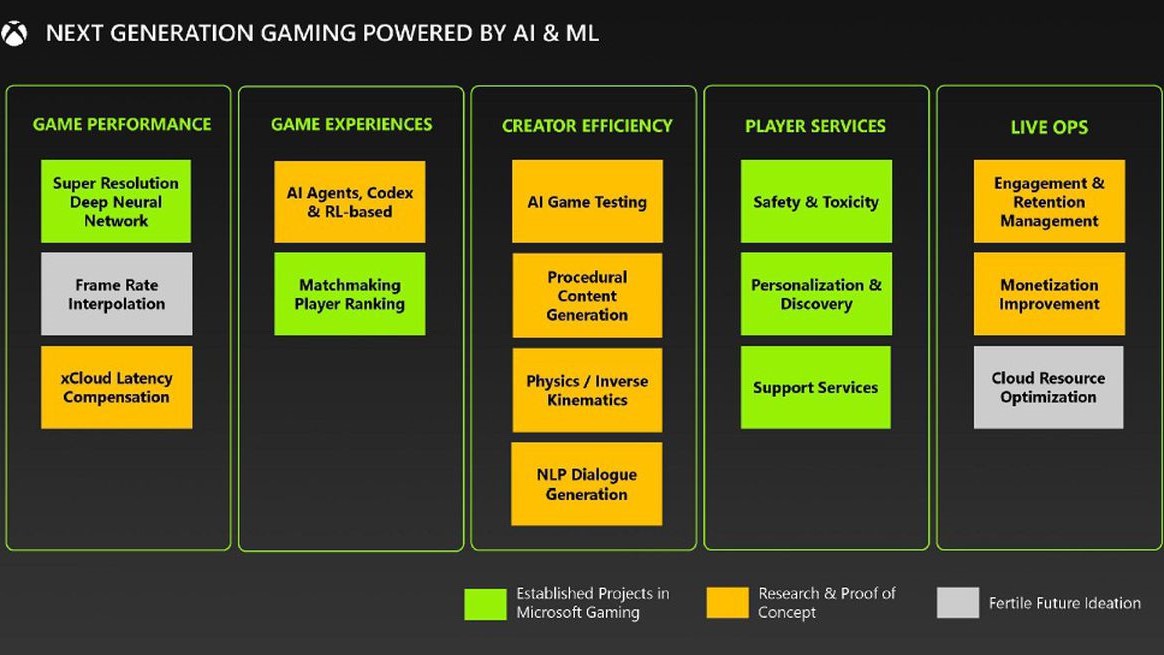
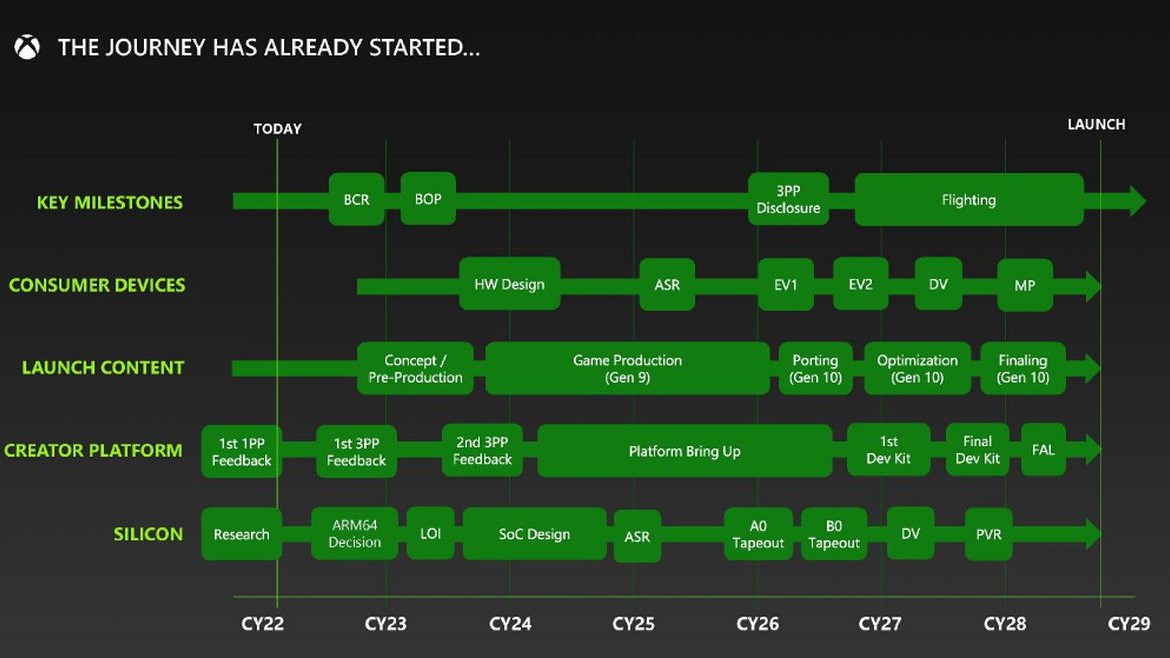
If Microsoft is going this route, then work on this device may have already started. Unfortunately, it's hard to tell since these documents are older. We do know that Microsoft has had ambitions for a low-cost, cloud-powered Xbox device for a while, possibly in the form of a TV streaming stick or compact console, but none of those plans have come to fruition as of yet. Microsoft may take this approach instead, giving Xbox Cloud Gaming time to mature and stabilize with lower latency, increased user capacity, a larger library, and more features.
More documents from the Xbox vs FTC case show that Microsoft has discussed being able to stream PC games from the cloud, a natural evolution for the service. Xbox has also announced that it does intend to allow users to stream their own personal games through the cloud, an obvious and highly requested feature, but that also has yet to materialize (despite PlayStation now having that feature).
Of course, strategies for Xbox Cloud Gaming are likely constantly changing. Adoption rates for the emerging tech are still negligible, while investment and operating costs to install server blades and run those servers are astronomically high. Microsoft has also been making a wide variety of deals with cloud gaming competitors and has even agreed to spin off the Xbox Cloud Gaming service in the UK in order to help push the Activision Blizzard acquisition through, further suggesting that Microsoft may be pivoting away from cloud gaming as a core strategy for the Xbox platform.
A hybrid approach to cloud gaming with the next generation of Xbox consoles may be the way to go for Microsoft, as leaked documents show that, at least at the time, Microsoft still firmly believed that cloud gaming is the way to reach a lot of untapped users in the market. It all relies on seamless access and a consistent experience, both of which could be aided by devices like the Project Sebile Xbox Universal Controller and affordable hardware built with the cloud in mind.
To this end, the leaked documents show Microsoft envisioning a one-handed controller and a mobile controller that users could employ to access cloud gaming on their personal devices. Xbox Cloud Gaming is already a useful way to play Xbox games while on the go, either with your phone or with a handheld device like the Logitech G Cloud. More investments in the space and dedicated peripherals from Microsoft or its partners could help attract more users, but nothing here is set in stone.
In fact, out of all the leaks listed here, those about Xbox's foray into the cloud are likely the least certain. It's practically guaranteed that the cloud will play a huge role in the future of Xbox, but the form that role will take is overcast. Cloud gaming is still an unproven market that requires a ton of investment to reach its potential, and Xbox Cloud Gaming may never reach a place where it can stand on its own as a separate subscription service from Xbox Game Pass.
Bethesda Softworks games roadmap
Zenimax Media and Bethesda Softworks are now a part of Xbox, and that means being a frequent part of the discussions during the Xbox vs FTC case. Part of the leaks is a roadmap for upcoming games published by Bethesda, and there are some interesting revelations on there. Fair disclaimer, though, the timelines on the above document are already inaccurate thanks to delays and changing plans.
The document makes mentions of multiple codenames like Projects Whirlwind, Hibiki, Ubu, Wanderer, Kestrel, and Platinum. We also get mentions of the in-development Indiana Jones game, a remaster of The Elder Scrolls IV: Oblivion, a new DOOM titled "Year Zero" with subsequent DLC, The Elder Scrolls VI, a mystery licensed IP game, a remaster of Fallout 3, a sequel to Ghostwire: Tokyo, Dishonored 3, and a variety of planned free-to-play or mobile titles.
That's a pretty stacked schedule with a lot of very exciting games, with remaster's of Bethesda's classic RPGs and sequels to DOOM, Ghostwire: Tokyo, and Dishonored chief among them. It'll be interesting to see how much of this comes to fruition, but at least bear in mind that we won't see a lot of it for like a long time (The Elder Scrolls 6 isn't expected until 2026 at the earliest).
Microsoft's ambitions to acquire Nintendo
This one is a bit, erm, silly. Apparently, Xbox head Phil Spencer has discussed in the past a desire for Microsoft to acquire... Nintendo. As farfetched as it may seem, it's actually far from the first time Microsoft has looked to make Nintendo a part of its portfolio, going as far back as before the release of the original Xbox in 2000. Spencer describes it as a "career moment" for him, while also mentioning Microsoft's considerations for acquiring Valve (Steam), Warner Brothers, and ZeniMax Media. Of course, the company has since acquired ZeniMax and Bethesda, but Nintendo is still far out of Microsoft's reach.
My colleague Rebecca Spear has gone more in-depth into why Xbox can't acquire Nintendo, and why that's good for both companies and for consumers. Nintendo is the major third play in the console market that brings crucial innovation to both hardware and software, experimenting in ways that Sony PlayStation and Microsoft Xbox simply don't. Nintendo's culture, philosophy, and library of unique IPs is wholly its own, too, resulting in a behemoth that no self-respecting regulator would allow to be acquired.
Still, do you want to see Microsoft acquire Nintendo?
Other assorted Xbox leaks
The recent Xbox leaks contain an absurd amount of information, from internal conversations and email chains to presentations on product pitches and strategy overviews. There's so much here that it's almost impossible to fit it all into one place, and a lot of it is pretty boring anyways. Still, as we find interesting tidbits from the leaks that don't fall in any of the previous categories, I'll stash them here for your perusal.
A perfect example being internal conversations at Microsoft discussing the PS5 reveal and — years later — the PS5 price hikes. Except, now we have even more information on the topic.
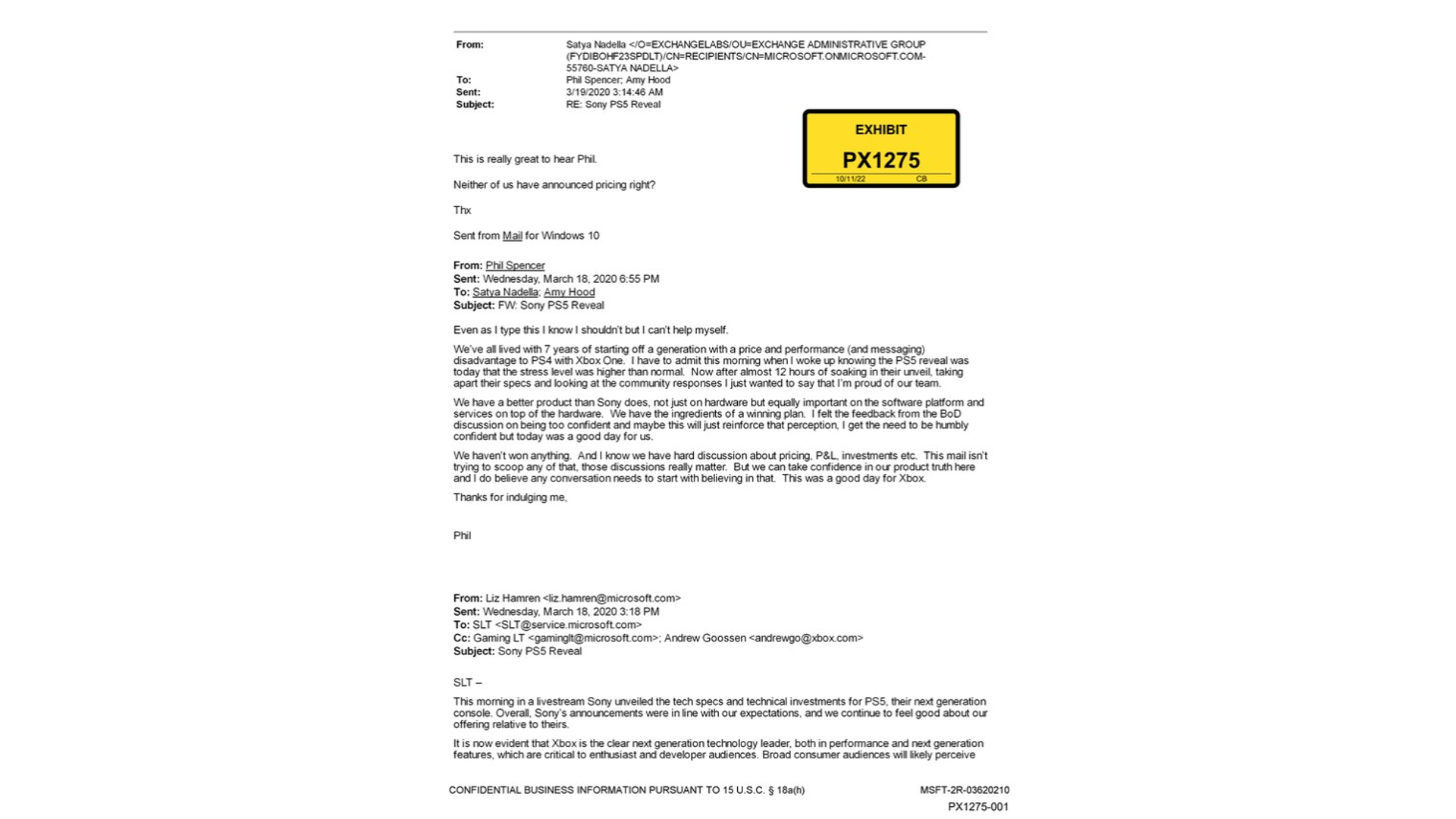

"We have a better product than Sony does, not just on hardware but equally important on the software platform and services on top of the hardware," Phil Spencer wrote in the above email. In the document, Microsoft employees discuss the PS5 specs reveal and how, while the PS5 does impress with a far superior SSD, the Xbox Series X still comes out on top with a performance edge. The Xbox team was also very confident in the complete package they had put together.
It's a fascinating email thread worth a read if you're interested in the topic, but there's not really any new or revelatory information here.
Recent Microsoft leaks: Surface and hardware
Microsoft's Surface line of hardware may not break sales charts, but it does provide an aspirational foundation for the company's many Windows OEM partners to refer to when designing their own hardware, resulting in the best Windows laptops you can buy. As such, it's always interesting to see what the Surface team is up to year-over-year, and if we'll see more minor spec bumps or more major refreshes and redesigns.
Well, we basically know what we're getting this year. Official renders of the Surface Laptop Studio 2 leaked, showcasing a very similar laptop with expanded I/O in the form of an additional USB Type-A port. We also have a fair idea what kind of internal upgrades we'll see thanks to Windows Central's own sources, including an H-series Intel 13th Gen Core i7 processor, NVIDIA RTX 4050 or 4060 graphics, and up to 64GB RAM. There should also be a brighter HDR-capable display and an upgraded haptic touchpad.
According to those same sources, we know the Surface Laptop Go 3 is arriving with a 12th Gen Core i5 processor, 8-16GB of RAM, and better repairability. The Surface Go 4 should arrive primarily for enterprise customers with an Intel N200 processor, 8GB RAM, and the same design as the Go 3.
If you're interested in what else Windows Central has heard recently, be sure to read our in-depth overview of what to expect at the Microsoft Surface and AI event happening on Sept. 21. That event is shrouded in a little mystery, however, we do know that Surface and Windows lead Panos Panay is suddenly leaving Microsoft to join Amazon, despite being previously confirmed to be in attendance at the event.
Recent Microsoft leaks: Windows and software
Windows 11 has been a fantastic operating system with a ton of visual, feature, and quality-of-life improvements over its predecessor, but interested users and Microsoft are both looking to the future. According to a leak earlier this year, Windows 12 is in the works and could arrive as soon as 2024. A follow-up exclusive from Windows Central details Microsoft's plans for Windows 12, with major updates planned focusing on AI, security, and faster updates.
Windows 12 is still a ways out, but it'll be interesting to see how Microsoft continues to modernize the platform to take advantage of new and emerging form factors like HP's unique foldable PC. We likely won't hear more about it at the upcoming Surface and AI event, but next year may be all about Windows 12.
Outside of Windows, Microsoft very recently had a massive 38TB of data mistakenly leaked by its AI research team. The leak contained an extensive amount of information, including backups of Microsoft employee computers, internal passwords and secret keys, and over 30,000 Microsoft Teams messages from over 350 employees. Microsoft patched the issue that caused the leak (an Azure feature known as a Secure Access Token, or SAS, that granted users unlimited access to Azure Storage resources), and promises that no customer data or internal services were compromised as part of the leak.

Zachary Boddy (They / Them) is a Staff Writer for Windows Central, primarily focused on covering the latest news in tech and gaming, the best Xbox and PC games, and the most interesting Windows and Xbox hardware. They have been gaming and writing for most of their life starting with the original Xbox, and started out as a freelancer for Windows Central and its sister sites in 2019. Now a full-fledged Staff Writer, Zachary has expanded from only writing about all things Minecraft to covering practically everything on which Windows Central is an expert, especially when it comes to Microsoft.
